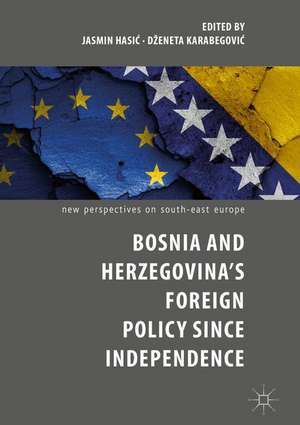Bosnia and Herzegovina’s Foreign Policy Since Independence: New Perspectives on South-East Europe
Editat de Jasmin Hasić, Dženeta Karabegovićen Limba Engleză Hardback – 15 mar 2019
Din seria New Perspectives on South-East Europe
- 9%
 Preț: 628.07 lei
Preț: 628.07 lei - 15%
 Preț: 643.34 lei
Preț: 643.34 lei - 15%
 Preț: 646.11 lei
Preț: 646.11 lei - 15%
 Preț: 641.85 lei
Preț: 641.85 lei -
 Preț: 390.63 lei
Preț: 390.63 lei -
 Preț: 390.25 lei
Preț: 390.25 lei -
 Preț: 393.52 lei
Preț: 393.52 lei - 15%
 Preț: 642.51 lei
Preț: 642.51 lei - 15%
 Preț: 642.51 lei
Preț: 642.51 lei - 18%
 Preț: 895.56 lei
Preț: 895.56 lei - 18%
 Preț: 950.52 lei
Preț: 950.52 lei - 18%
 Preț: 777.50 lei
Preț: 777.50 lei -
 Preț: 485.24 lei
Preț: 485.24 lei - 18%
 Preț: 789.52 lei
Preț: 789.52 lei - 18%
 Preț: 791.57 lei
Preț: 791.57 lei -
 Preț: 386.81 lei
Preț: 386.81 lei -
 Preț: 393.52 lei
Preț: 393.52 lei -
 Preț: 388.90 lei
Preț: 388.90 lei -
 Preț: 387.20 lei
Preț: 387.20 lei
Preț: 729.53 lei
Preț vechi: 889.68 lei
-18% Nou
Puncte Express: 1094
Preț estimativ în valută:
139.59€ • 145.75$ • 115.53£
139.59€ • 145.75$ • 115.53£
Carte tipărită la comandă
Livrare economică 04-18 aprilie
Preluare comenzi: 021 569.72.76
Specificații
ISBN-13: 9783030056537
ISBN-10: 3030056538
Pagini: 241
Ilustrații: XXV, 262 p.
Dimensiuni: 148 x 210 mm
Greutate: 0.5 kg
Ediția:1st ed. 2019
Editura: Springer International Publishing
Colecția Palgrave Macmillan
Seria New Perspectives on South-East Europe
Locul publicării:Cham, Switzerland
ISBN-10: 3030056538
Pagini: 241
Ilustrații: XXV, 262 p.
Dimensiuni: 148 x 210 mm
Greutate: 0.5 kg
Ediția:1st ed. 2019
Editura: Springer International Publishing
Colecția Palgrave Macmillan
Seria New Perspectives on South-East Europe
Locul publicării:Cham, Switzerland
Cuprins
1 Structure, Frameworks, Processes, Institutions and Actors of BiH Foreign Policy since Independence (J. Hasić and D. Karabegović).- 2 BiH’s Wartime Foreign Policy: Lobbying for Peace and Lifting the Arms Embargo (A. Sokol).- 3 BiH’s Engagement in Multilateral Fora: Key Foreign Policy Positions within International Organizations (N. Džananović).- 4 Euro-Atlantic Integrations of Bosnia and Herzegovina: Shifting Gears and Reinterpreting Motives in Foreign Affairs (D. Čepo).- 5 Foreign Economic Policy and Trade Relations of BiH (A. Kalamujić).- 6 BiH's Foreign Policy Orientation Towards International Judicial Institutions (C. Bonora).- 7 Bosnia and Herzegovina’s Contributions to International Military-Security-Peace Operations (T. Domi and D. Petrić).- 8 A Strategic Review of BiH’s Bilateral Relations with the Major Powers (J. Mujanović).- 9 BiH’s Foreign Policy towards Neighboring Countries: Patterns of Reinterpretation and Redefinition (P. Marković and M. Subašić).- 10 ‘Protection and Promotion of BiH's Citizens’ Interests Abroad’: Foreign Policy Relations with Diaspora (D. Karabegović and J. Hasić).- 11 BiH Foreign Policy Governance: Evolutive Practices and Contested Discourses (N. Andjelić).
Notă biografică
Jasmin Hasić is Assistant Professor at the Department of International Relations and European Studies, International Burch University, Bosnia and Herzegovina.
Dženeta Karabegović is Researcher at the University of Salzburg, Austria.
Dženeta Karabegović is Researcher at the University of Salzburg, Austria.
Textul de pe ultima copertă
This book is the first to provide a comprehensive and systematic analysis of the foreign policy of Bosnia and Herzegovina, a post-conflict country with an active agency in international affairs. Bridging academic and policy debates, the book summarizes and further examines the first twenty-five years of BiH’s foreign policy following the country’s independence from Yugoslavia in 1992. Topics covered include conflict and post-conflict periods, Euro-Atlantic integration, political affairs on both local and regional levels, integration with a variety of international organizations and actors, neighboring states, bilateral relations with relevant other states including the United States, Russia, selected EU countries, and Turkey, as well as BiH’s diaspora. The book highlights that despite their apparent weakness, post-conflict states have agency to carry out foreign policy goals and engage with the international sphere, including in geopolitics, and thus provides a novel insight into weakstates and their role in international politics.Jasmin Hasić is Assistant Professor at the Department of International Relations and European Studies, International Burch University, Bosnia and Herzegovina.
Dženeta Karabegović is a researcher at the University of Salzburg, Austria.
Dženeta Karabegović is a researcher at the University of Salzburg, Austria.
Caracteristici
The first comprehensive and systematic analysis of BiH's foreign policy since the country’s independence Offers new perspectives and analysis with regard to EU integration and BiH’s dedication to the process Provides a novel examination of weak states and their role in international politics
